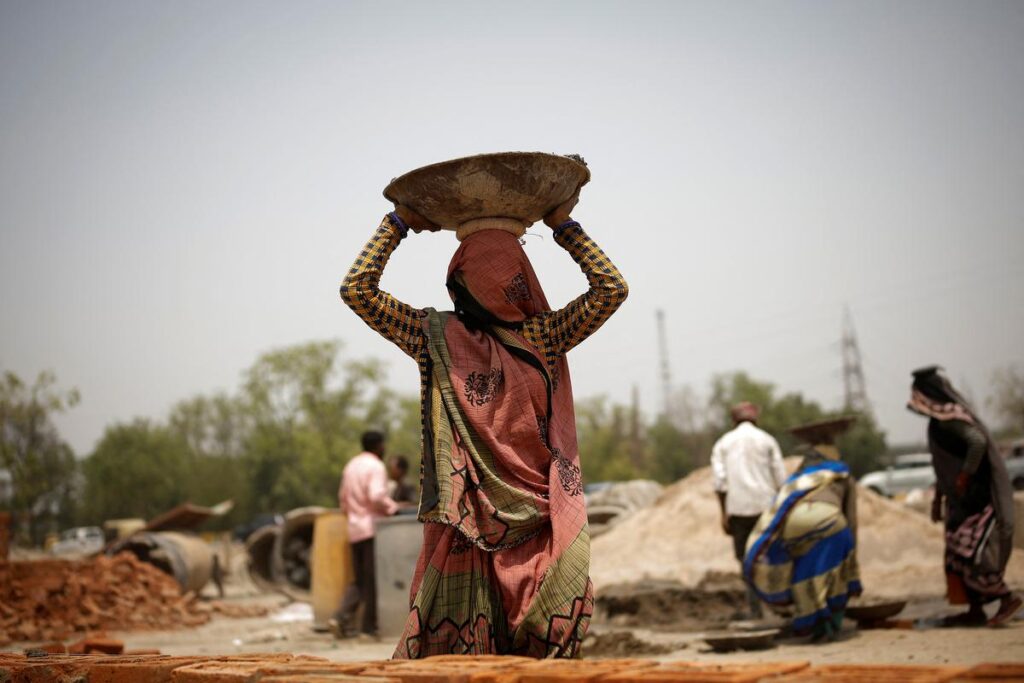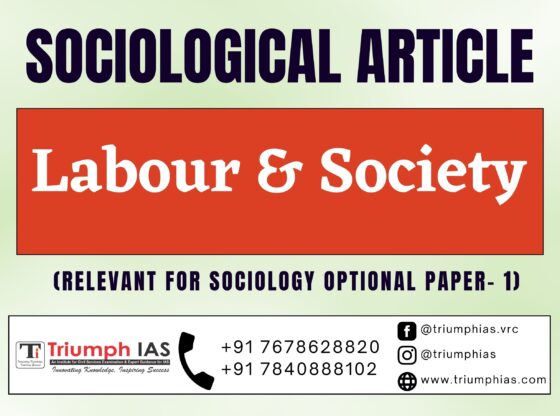Labour & Society
Relevant for sociology optional Paper- 1 (Unit- 6 : Sociology- Works & Economic Life)

Labour and society are intimately connected, with the former being a fundamental aspect of the latter. Labour refers to the physical and mental work that individuals engage in to produce goods and services, while society encompasses the larger social, cultural, economic, and political structures that shape our lives. Understanding the relationship between labour and society is essential for understanding the dynamics of work, the role of workers in society, and the ways in which work affects social inequality and social change.
One of the key ways in which labour and society are connected is through the organization of work. The way in which work is organized, structured, and managed has a significant impact on the lives of workers and on the broader society. The organization of work can take many forms, including formal and informal structures, paid and unpaid labour, and various forms of exploitation and oppression.
Historically, the organization of work has been shaped by a variety of factors, including technological advances, economic systems, and social and cultural norms. In feudal societies, for example, work was organized around the feudal hierarchy, with serfs working the land in exchange for protection and other forms of support from their lords. In industrial capitalist societies, work is organized around the factory system, with workers selling their labour in exchange for wages.
Another way in which labour and society are connected is through the role of workers in society. Workers are not simply passive participants in the economy, but are active agents who shape and are shaped by the larger social structures in which they live and work. Workers have the power to influence social change through collective action, such as union organizing and strikes.
The relationship between labour and society is also shaped by social inequality. In many societies, certain groups of workers are more vulnerable to exploitation and oppression than others, such as women, racial and ethnic minorities, and migrant workers. This inequality is often reinforced by broader social structures, such as patriarchal and racist systems that devalue certain types of work or exclude certain groups of workers from access to certain jobs and opportunities.
Furthermore, the relationship between labour and society is shaped by the broader economic and political systems in which they are embedded. For example, capitalist systems prioritize profit over the well-being of workers, often leading to exploitative and oppressive working conditions. Similarly, political systems can either support or undermine the rights and protections of workers, depending on their policies and priorities.
In order to understand the relationship between labour and society, it is important to consider the different perspectives and approaches that have been developed in the field of sociology. One such approach is the Marxist perspective, which views labour as a key site of class struggle between workers and capitalists. According to this perspective, the organization of work is shaped by the interests of the ruling class, who seek to extract the maximum amount of profit from the labour of workers.
Another important perspective in the study of labour and society is the feminist perspective. Feminist scholars have highlighted the ways in which gender shapes the organization of work and the experiences of workers. They have also pointed out the ways in which patriarchal systems devalue certain types of work, such as care work, that are traditionally associated with women.
A third perspective in the study of labour and society is the global perspective, which emphasizes the ways in which the organization of work is shaped by global economic and political systems. Globalization has led to the emergence of new forms of labour, such as the gig economy, and has created new challenges for workers in terms of job security and working conditions.
In conclusion, the relationship between labour and society is complex and multifaceted. The organization of work, the role of workers in society, social inequality, economic and political systems, and various perspectives and approaches all play a role in shaping this relationship. Understanding these dynamics is essential for understanding the challenges and opportunities facing workers in the modern world, and for working towards a more just and equitable society that values and protects the rights and dignity of all workers, regardless of their race, gender, nationality, or socio-economic status. As such, ongoing research and analysis in the field of sociology can help us to continue to deepen our understanding of the complex relationship between labour and society, and to develop strategies for addressing the ongoing challenges and opportunities facing workers and the broader society.
For more such notes, Articles, News & Views Join our Telegram Channel. https://t.me/triumphias
Click the link below to see the details about the UPSC –Civils courses offered by Triumph IAS. https://triumphias.com/pages-all-courses.php


